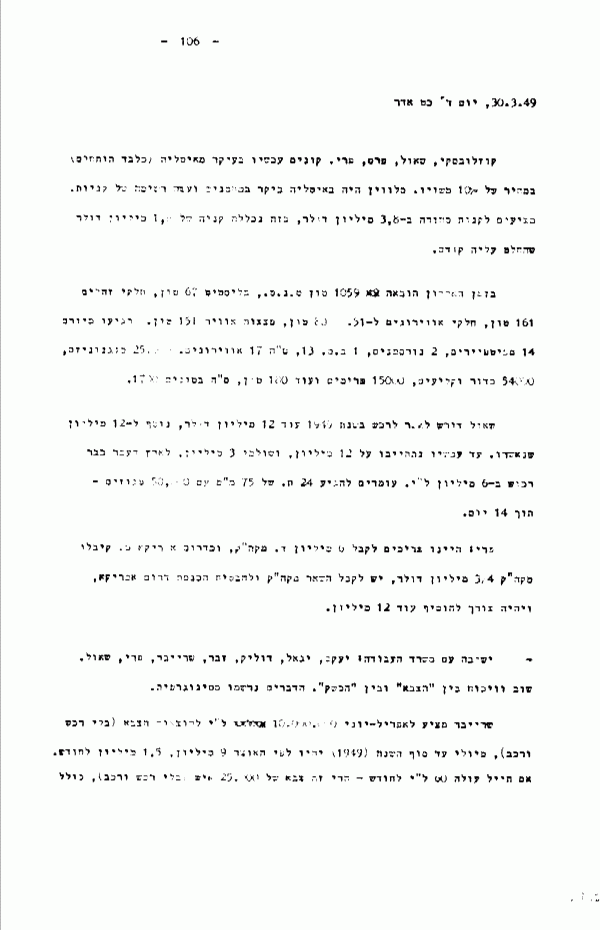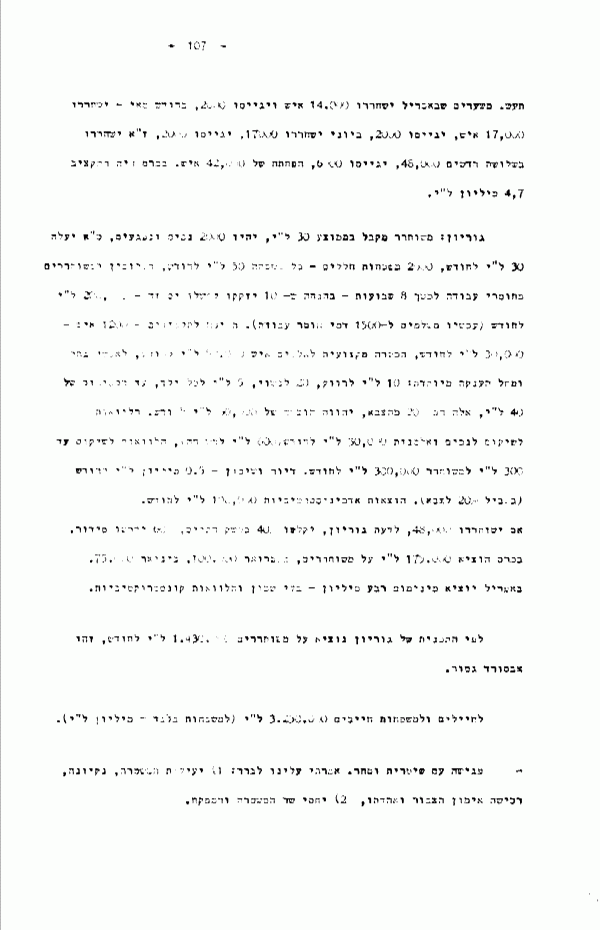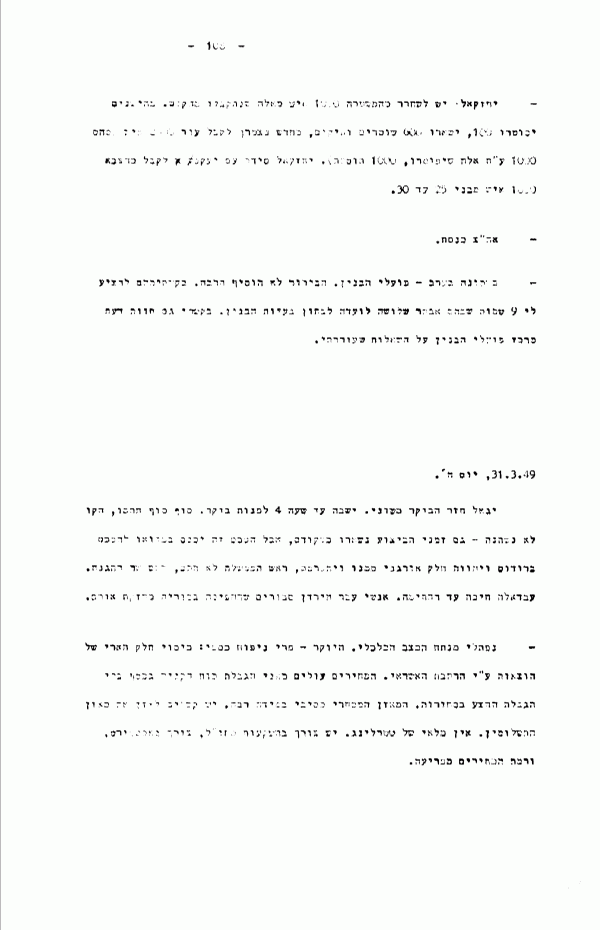1
of
Places:
United States
Italy
The use of the photograph is subject to the Copyright Law, 2007
30.03.1949
226094
Wednesday, March 30, 1949 Kozlowski, Shaul, Peres, Peri. They’re primarily buying in Italy now (aside from cannons) at a price equal to 10% of the value [?]. Slavin was in Italy, visited warehouses, and made a list of purchases. They propose buying merchandise at $3.8 million, which includes the $1.8 million purchase decided upon earlier. Recently [the following] were imported[:] 1,059 tons of TNT, ballistite 67 tons, half-track parts 161 tons, airplane parts for [P?]-51 80 tons, aerial bombs 151 tons. [The following] arrived from Yoram[:] 14 Spitfires, 2 Norsemen, 1 BT-13, in total 17 airplanes. 25,000 mechanisms, 54,000 bullets and rounds, 15,000 [primers?] etc. 180 tons, total in tons 1,700. Shaul requests that an additional $12 million be authorized for procurement in 1949, in addition to the 12 million that was approved. So far they’ve made commitments of 12 million, and paid 3 million; so far goods worth P£ 6 million have been transferred to the country. 24 75 mm C. [cannons] with 50,000 shells are due to arrive – within 14 days. Peri: We were supposed to receive $6 million from KKL [the Jewish National Fund], and from South America 6. From KKL [they] received $ 3.4 [?] million; need to receive the remainder from KKL and ensure the South America income, and it will be necessary to add another 12 million. – Meeting with the Ministry of Labor: Ya’akov, Yigael, Dolik, Zabar [Zabrasky?], Schreiber, Peri, Shaul. Again an argument between the “army” and the “economy.” A stenographic record was made. Schreiber proposes P£ 10,000,000 for army expenses (excluding procurement and vehicles) for April-June; from July through the end of the year (1949) there will be, according to the Finance [Ministry], 9 million, 1.5 million per month. If a soldier costs P£ 60 per month – then this is an army of 25,000 men (excluding procurement and vehicles), including Ta’as [weapons manufacturing]. They estimate that 14,000 men will be discharged in April and 2,000 conscripted, in May – 17,000 will be discharged, 2,000 conscripted; in June 17,000 will be discharged, 2,000 conscripted; that is, over the course of three months 48,000 will be discharged, 6,000 conscripted, a decrease of 42,000 men. In March the budget will be P£ 4.7 million. Gurion: A discharged soldier receives P£ 30 on average; there will be 2,000 disabled and war-afflicted, each will receive P£ 30 per month; 2,000 families of fallen soldiers, each family P£ 50 per month; payments to discharged soldiers with no employment over the course of 8 weeks – assuming that 10% will require these payments – P£ 200,000 per month (currently 1,500 are receiving unemployment wages). Support for students – 1,200 individuals – P£ 30,000 per month; vocational training for 2,000 individuals P£ 50,000 per month; for GAHAL [foreign recruitment] and MAHAL [volunteers from abroad] members a special grant: P£ 10 for an unmarried person, 20 for a married person, P£ 5 for each child, up to a maximum of P£ 40; they account for 20% of the army, will constitute an expense of P£ 60,000 per month. Loans for rehabilitation for the disabled and widows P£ 30,000 per month (P£ 600 per family), loans for rehabilitation up to P£ 300 per discharged soldier, P£ 300,000 per month. Housing and accommodation – P£ 0.5 million (for 20% of the army). Administrative expenses of P£ 100,000 per month. If 48,000 are discharged, in Gurion’s opinion, 40% will be integrated into the existing economy, 60% will require an arrangement. In March he spent P£ 175,000 on discharged soldiers, in February 100,000, in January 75,000. In April he’ll spend a minimum of a quarter million – not counting housing and constructive loans. Under Gurion’s plan, we’ll spend P£ 1,430,000 per month on discharged soldiers, which is completely absurd. For soldiers and families we’d owe P£ 3,250,000 (just for families – P£ 1 million). – Meeting with Sheetrit and Sahar. I said that we must clarify: 1) the effectiveness of the army, its cleanliness, securing the public’s trust and support, 2) relations between the minister of police and the inspector. – Yehezkel: Need to release from the police 1,000 of those who were received in intake. Of the long-standing ones, 100 [1,000?] will be dismissed, 600 experienced policemen will remain; of the new [ones] we’ll need to accept another 2,000 men (1,000 of them as against those dismissed, 1,000 additional). Yehezkel arranged with Ya’akov to receive a thousand men from the army aged 25-30. – In the afternoon Knesset. – At 8 p.m. – construction workers. The discussion didn’t add much. I asked them to give me a proposal for 9 names, from whom I would select three for a committee to examine construction problems. I also asked for an expert opinion from the construction workers’ coordinator regarding the questions I’d raised.











